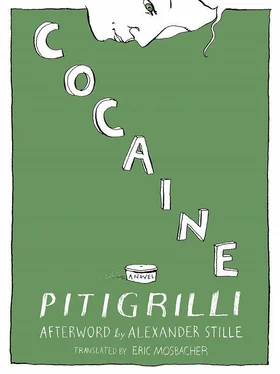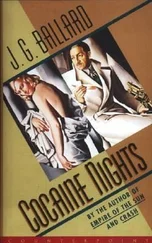He lingered over the gaps in international law, described the executioner’s face, reported a brief interview with that sinister individual, who turned out after all to be a decent fellow, but times were hard, things were very expensive, and you had to do something to make a living. He explained how the guillotine worked, and added some colorful notes about the state of mind of the condemned man. By means of a clever stratagem he had been the only Paris journalist who had gained access to the condemned cell a few hours before the execution.
“ But why did you kill all those schoolmistresses?” I asked the murderer.
“ I disliked them,” the man replied in matter-of-fact tones and with a smile. “If it’s legal to kill a man who makes a murderous attack on you or seduces your wife or breaks into your house to rob, why shouldn’t it be legal to kill a man whom you dislike? Isn’t dislike the best of all reasons?”
Tito decided that he had not sufficiently described the unfortunate man’s behavior in the face of the scaffold, so he added his last words:
I’m innocent. I swear before God and man that I did not kill those twenty-seven schoolmistresses.”
But that struck him as too rhetorical. So he crossed it out and wrote instead:
“ I killed those twenty-seven schoolmistresses and am content. If I had to live my life over again, I should do it again. ”
But then he realized that such cynical behavior would have caused the crowd to yell with indignation, in which case he would have had to alter some parts of his story.
So again he crossed out the condemned man’s last words and substituted the following:
“ Mother, mother, save me.”
But she could not save him, because she was in Jamaica and could not hear him; she was in a beautiful cemetery in Jamaica in which pineapples grew.
It was six o’clock by Tito’s watch, and he had filled thirty sheets with his handwriting.
He didn’t read through what he had written. He put it in an envelope, wrote on it — Urgent. Send to the composing room immediately , and rang the bell.
“Waiter, have this sent to my newspaper as quickly as possible, by taxi if necessary.”
And while the waiter was still on his way out he collapsed on to the bed, dropping first one slipper on to the carpet and then the other.
The sheets were still warm.
Six hours later the telephone rang and woke him.
“Yes, it’s me,” he said with a yawn.
“You wretch. This is your editor speaking.”
“Oh, good morning, sir.”
“You’ve ruined the paper for me. The execution did not take place.”
“Good.”
“He was reprieved at the last moment.”
“I’m delighted to hear it, sir.”
“What do you mean? Your story —”
“All you have to do is not publish it.”
“But we put it on the front page.”
“Then take it out, sir.”
“It’s been on sale in the streets of Paris for four hours.”
“Oh, has it? What’s the time?”
“Twelve o’clock.”
“Strange. But what harm has been done? He was reprieved by the President of the Republic at three o’clock this morning? Do you mean to tell me that the President of the Republic has nothing better to do at three o’clock in the morning? In any case, we can face public opinion and our own consciences with an easy mind. We carried out our journalistic duty scrupulously and to the point of self- sacrifice. A stupid little incident like a presidential reprieve is not sufficient reason to deprive our readers of such an interesting story. The purpose of the death penalty, according to modern penal theory, is not so much punishment as the setting of an example, and by describing it as if it had happened — we have done our journalistic duty in full consciousness of the social responsibility of the daily press.”
There was no reply from the other end of the line. Tito went on talking imperturbably for some time without realizing that the editor had long since rung off.
Down below in the square newspaper sellers were shouting the name of the newspaper that had printed a special edition giving full details of the execution of Marius Amphossy, from Jamaica, the mass murderer of schoolmistresses, and the sound of their voices was audible all the way up to the fourth floor of the Hotel Napoléon.
Madame Kalantan Ter-Gregorianz’s husband owned some inexhaustible oil wells.
“Let me introduce Dr Tito Arnaudi.”
“Stay for lunch,” her husband said.
In spite of all his oil he was bald and, though he was rich, he was young.
He didn’t like Paris and wasn’t very fond of his wife, though at intervals he liked both. Every two or three months he interrupted his flitting between foreign cities and different women to linger over the vices of Paris and those of his wife. But she could not please him permanently, because she was too nervy and too thin. He only liked fat women. The fatter they were, the more they attracted him. In affairs of the heart he obeyed the celebrated law of physics which says that attraction is proportionate to mass.
“My wife and I are leaving for Deauville tomorrow,” he said. “Do you like the sea? We can easily put you up.”
Tito accepted the invitation.
Next day, though he had not obtained the editor’s permission to take a month’s leave, he took it all the same and left with the Ter-Gregorianz couple for the fashionable seaside resort.
The two men were in perfect agreement in saying nasty things about the Turks (in whom Tito was totally uninterested) and in singing the praises of vegetarianism (in which the Armenian was totally uninterested). They played bridge and snooker, went for long drives by the sea, listened to the waves, which talk in hexameters and pentameters; and Tito, who was sometimes more sentimental than a clown, agreed with Verlaine that la mer est plus belle que les cathédrales. In the evening they played baccarat, and they bathed.
Tito could swim. The Armenian gentleman couldn’t, but Tito taught him, not well enough to swim the channel, but at any rate well enough to save himself in a shipwreck. What Tito failed to teach him, probably because the Armenian was so thin, was to float on the water like a corpse.
He held him and told him to sink the top of his head four inches below the surface and to stay like that with his body motionless and with open arms. He explained to him the principle of Archimedes according to which a body immersed in a liquid…
But as soon as Tito let him go the Armenian sank like a stone.
“How’s it going?” Kalantan asked with a smile every morning when they came back in their beach pajamas.
“I can swim under water and I can do twelve yards in a minute, but as for floating like a corpse, I simply can’t manage it.”
One day M. Ter-Gregorianz went swimming alone in a quiet inlet. A treacherous wave overwhelmed him and swallowed him up. He tried to call out, but water got into his mouth and he couldn’t. Two legs were seen emerging from the water as if calling for help, and then nothing at all.
Tito walked back to the hotel alone, and Kalantan came strolling towards him with her hands in her pockets like a man.
“Well?” she said, “has my husband learnt to float like a corpse?”
“Yes,” Tito replied.
They buried him in Paris, in the Armenian Gregorian Cemetery. All his wife’s past lovers were to be seen at the funeral, and her future lovers as well.
Tito, in the front rank, was conspicuous among them.
The reader will find details of how Tito became the Armenian lady’s lover in any other novel. In particular I recommend those that systematically describe all the phases of falling in love and end with irreproachable modesty at the precise moment when the couple, having had three hundred chaste pages of inconclusive posturing devoted to them, exchange the first really sustained kiss.
Читать дальше



